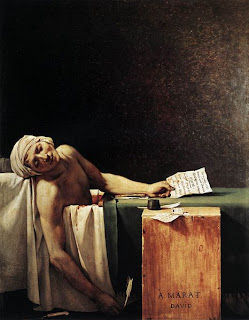(Beneath the Bathtub, the Ocean)
 When we first meet the General, he is in the bath. But this is not so much a place for cleansing refreshment and revitalizaton: it is more of a watery grave. As the General’s loyal aide and manservant, José Palacios, catches sight of his master floating naked with his eyes open in the bath’s purgative waters, he believes that the great man has drowned.
When we first meet the General, he is in the bath. But this is not so much a place for cleansing refreshment and revitalizaton: it is more of a watery grave. As the General’s loyal aide and manservant, José Palacios, catches sight of his master floating naked with his eyes open in the bath’s purgative waters, he believes that the great man has drowned. Not that the General’s demise is marked by tragedy. On the contrary: Palacios reads on the semi-submerged body before him the signs of an “ecstacy” that is reserved only for those who are no longer of this world. The General is known for his habit of bathtime meditation; he has now simply gone a step further, and entered a state of blessedness that is no longer mortal, no longer human. No wonder Palacios approaches with trepidation, fearful of coming too close. The General is his master, but the master’s death promises not liberation but rather a new form of enchantment. Palacios softly calls to the inert form in the tub, fulfilling his orders to wake the General up even if he senses that the great man is now beyond the call of a human voice. Palacios’s is a voz sorda: a lowered or whispered voice, but also literally a deaf voice, an unhearing sound that calls out without the expectation of response from an unhearing ear.
In fact, however, the supposed corpse in the bath does respond. The General Simón Bolívar (for it is he) emerges from his stupor, his state of enchantment, and with unexpected force and grace he rises from the waters. Yet even this sudden rush of energy is compared to the “spirit of a dolphin”: an animal that leaps above the waves only to fall back down almost as soon as it has appeared. The General Bolívar, asleep or awake, is in his labyrinth. And in the book that this incident introduces, Gabriel García Márquez’s El general en su laberinto, the great Latin American Liberator will remain always on the verge, hovering somewhere between life and death, reason and ecstasy, the dazzling surface and the deadening deep.
And so also, perhaps more importantly, the General as García Márquez depicts him is also endlessly hovering between his mortal body and his impulse to mastery, between the material depradations of his encroaching illnesses and his continued ambition to construct and consolidate a united Latin American republic. Throughout what will follow, an account of his watery passage down the Magdalena river from upland Bogotá to the Caribbean sea, the General is, in other words, rather precariously suspended between biology and politics, the two poles, as Roberto Esposito observes, of what we have come to call biopolitics. Simón Bolívar, the body in the bathtub, is the biopolitical subject par excellence.
Read more... (.pdf document)

